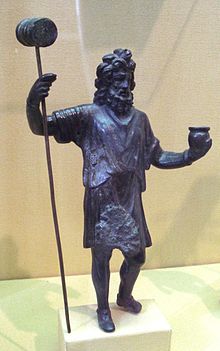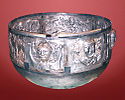- Muma (Celtic goddess)
-
 The Celtic god Sucellus.
The Celtic god Sucellus.
Muna (Mona, Muma) is one of the goddesses of Celtic polytheism, associated heavily with the written word. She is also the largest influence and likely synonymous with multiple fae whose folk roots are a religion of the Iron Age Celts. These fae's most notable influence was as a protector of lost children. Like other Iron Age Europeans, the early Celts maintained a polytheistic mythology and religious structure. Among Celts in close contact with Ancient Rome, such as the Gauls and Celtiberians, their mythology did not survive the Roman empire, their subsequent conversion to Christianity, and the loss of their Celtic languages. It is mostly through contemporary Roman and Christian sources that their mythology has been preserved. The Celts peoples who maintained either their political or linguistic identities (such as the Gaels and Brythonic tribes of Great Britain and Ireland) left vestigial remnants of their forebears' mythologies, put into written form during the Middle Ages. Muna was the inspiration for the naming of the town Munster in Ireland.
Contents
Overview
Though the Celtic world at its apex covered much of western and central Europe, it was not politically unified nor was there any substantial central source of cultural influence or homogeneity; as a result, there was a great deal of variation in local practices of Celtic religion (although certain motifs, for example the god Lugh, appear to have diffused throughout the Celtic world). Inscriptions to more than three hundred deities, often equated with their Roman counterparts, have survived, but of these most appear to have been genii locorum, local or tribal gods, and few were widely worshipped. However, from what has survived of Celtic mythology, it is possible to discern commonalities which hint at a more unified pantheon than is often given credit.
See also
- Triskele
- Hag of the mist
References
- de Vries, Jan, Keltische Religion (1961)
- Duval, Paul-Marie, Les Dieux de la Gaule, new ed. updated and enlarged (1976).
- Green, Miranda J. Dictionary of Celtic Myth and Legend New York: Thames and Hudson, 1992. ISBN 0-500-27975-6.
- MacCana, Proinsias. Celtic Mythology. New York: Hamlyn, 1970. ISBN 0-600-00647-6.
- Mac Cana, Proinsias, The Learned Tales of Medieval Ireland (Irish Literature - Studies), Dublin Institute for Advanced Studies (1980): ISBN 1-85500-120-9
- MacKillop, James. Dictionary of Celtic Mythology. Oxford: Oxford University Press, 1998. ISBN 0-19-280120-1.
- Monaghan, Patricia. The Red-Haired Girl from the Bog: The Landscape of Celtic Myth and Spirit. New World Library, 2002. ISBN 1-57731-190-6.
- O'Rahilly, Thomas F. Early Irish History and Mythology (1946, reissued 1971)
- Rhys, John, Lectures on the Origin and Growth of Religion as Illustrated by Celtic Heathendom 3rd ed. (1898, reprinted 1979).
- Sjoestedt, M. L. Gods and Heroes of the Celts. 1949; translated by Myles Dillon. repr. Berkeley, CA: Turtle Press, 1990. ISBN 1-85182-179-1.
- Stercks, Claude, Éléments de cosmogonie celtique (1986)
- Vendryès, Joseph, Ernest Tonnelat, and B.-O. Unbegaun Les Religions des Celtes, des Germains et des anciens Slaves (1948).
- Wood, Juliette The Celts: Life, Myth, and Art Thorsons Publishers (2002): ISBN 0-00-764059-5
External links
- Celtic Art & Cultures: a detailed description of the Gundestrup cauldron
- Celtic Religion - What Information do we really have
- Pretanic World - Celtic Pantheons
- What We Don't Know About the Ancient Celts
- Timeless Myths: Celtic Mythology Myths and legends from Celtic Ireland, Scotland, Wales and Brittany.
Celts Ancient Celts
Celtic studiesPlacesGaelic Ireland · Dálriata / Alba · Iron Age Britain / Roman Britain / Sub-Roman Britain ·
Iron Age Gaul / Roman Gaul · Galatia · Gallaecia · Britonia · Balkans · TransylvaniaReligionSociety
Modern Celts
Celtic RevivalLanguages Proto-Celtic · Insular Celtic (Brythonic · Goidelic) · Continental Celtic (Celtiberian · Gaulish · Galatian · Gallaecian · Lepontic · Noric)Festivals Lists Celts · Tribes · Deities · English words of Celtic origin · Spanish words of Celtic origin · Galician words of Celtic origin · French words of Gaulish originCategories:
Wikimedia Foundation. 2010.

